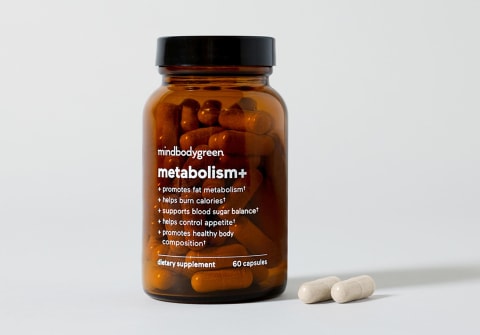Advertisement
7 Foods That Support A Healthy Metabolism & Other Ways To Optimize Metabolic Health


The foods we eat have a direct impact on how our bodies function. Eating a balanced diet is key to feeling good day in and day out—and it's key for supporting a healthy metabolism, too.
Read more to learn about different foods that can be beneficial to maintain a healthy metabolism.
Healthy foods that support metabolism
So what exactly is metabolism? "Metabolism is a fancy term to describe the intricate pathways within our cells and body that ultimately keep the body moving and functioning," says Tracy Lockwood Beckerman, M.S., R.D., CDN, a registered dietitian and the author of The Better Period Food Solution. "The end product of metabolism is the energy needed for vital functions in the body such as digestion, breathing, growth, and much more."
Sam Schleiger, M.S., RDN, C.D., CLT, IFNCP, a functional medicine R.D. and women's health specialist tells mindbodygreen, "A balanced diet consisting of nutrient-rich foods can help optimize metabolic function."
According to Schleiger, these are some healthy foods and drinks that can support a healthy metabolism:
- Quality proteins
- Healthy fats
- Fruits and vegetables
- Whole grains
- Spices
- Green tea
- Water
Some foods require more energy to digest and increase your metabolism, including different types of protein like chicken, fish, lean beef, eggs, and legumes. "Eating foods that are high in protein can help to spike up metabolism," says Beckerman. "That's because it takes the body more energy to break down amino acids in proteins than metabolizing carbohydrates and fats1."
Fruits and vegetables are always recommended for a healthy diet, and that's because these foods are rich in an array of minerals, vitamins, and antioxidants. "They provide essential nutrients for metabolic processes and overall health2," says Schleiger.
Fats often get a bad rap—but not all fats are the same. "Foods like avocados, nuts, seeds, and olive oil contain beneficial monounsaturated and polyunsaturated fats that support cellular function and hormone production," says Schleiger.
And if you love adding spices to your recipes, some can help increase metabolism. "Spices like chili peppers, cayenne pepper, and ginger can temporarily boost metabolism3 by increasing body temperature and triggering a slight increase in calorie burning," she says.
Whole grains, such as brown rice, oats, quinoa, and whole wheat bread, are an important food group that provides different nutrients. "They have a higher fiber content, which aids in digestion and keeps you feeling fuller for longer4," says Schleiger.
Drinking sufficient water daily is key for minimizing dehydration and feeling good overall, so it's not surprising that water is crucial for a healthy metabolism. "Staying hydrated is important for optimal metabolism," says Schleiger. Drinking enough water helps maintain cellular functions, digestion, and nutrient absorption5."
How to get your metabolism back up to speed
In addition to eating healthy foods, you can boost your metabolism through different lifestyle habits. Exercising often, whether it's going for a run, doing a cardio workout, or taking a dance or yoga class, is important for keeping the body active and in good health.
Plus, physical activity helps metabolism. "Engaging in regular exercise, including both cardiovascular activities and strength training, can help increase muscle mass and boost metabolism6," says Schleiger. "Muscle tissue is more metabolically active than fat tissue7, so having more lean muscle can contribute to a higher metabolic rate."
Another lifestyle habit that you may not associate with metabolism is sleep. Sleep is fundamental for our bodies to be able to rest, recharge, and reset in order to function each day. "Getting enough quality sleep is crucial for maintaining a healthy metabolism," says Schleiger. "Lack of sleep can disrupt hormonal balance and lead to metabolic dysregulation8," she says.
Life can be stressful with too much to do and not enough time in the day with hectic schedules and lots of responsibilities at work and at home. Too much stress can wreak havoc on our system as well as our metabolism9, so learning to manage stress is key.
"Chronic stress can affect metabolism and lead to imbalances in hormone levels10," says Schleiger. If you're feeling stressed and overwhelmed, she recommends, "Engage in stress-reducing activities such as meditation, deep breathing exercises, or engaging in hobbies you enjoy."
Finally, metabolism-boosting supplements—often containing green tea extract, caffeine, and other thermogenic compounds—can be used to bolster metabolic health. However, Schleiger notes you'll want to consult with a healthcare professional before considering any supplements.
The takeaway
Eating a varied diet that focuses on healthy fats, quality proteins, and plenty of fruits and vegetables is key to supporting a healthy metabolism.
Exercising daily, getting a good night's rest each night, and managing stress are all components of supporting a healthy metabolism.
10 Sources
- https://www.ncbi.nlm.nih.gov/pmc/articles/PMC524030/
- https://pubmed.ncbi.nlm.nih.gov/22656379/
- https://www.ncbi.nlm.nih.gov/pmc/articles/PMC6088424/
- https://www.ncbi.nlm.nih.gov/pmc/articles/PMC6352252/
- https://www.ncbi.nlm.nih.gov/pmc/articles/PMC2908954/
- https://pubmed.ncbi.nlm.nih.gov/8175496/
- https://pubmed.ncbi.nlm.nih.gov/2243122/
- https://pubmed.ncbi.nlm.nih.gov/24816752/
- https://pubmed.ncbi.nlm.nih.gov/18370704/
- https://www.ncbi.nlm.nih.gov/pmc/articles/PMC3079864/



















